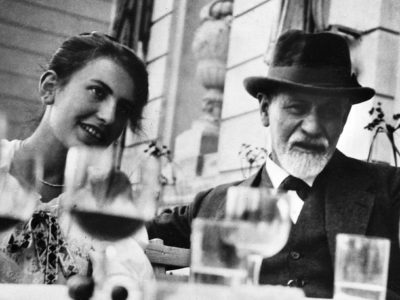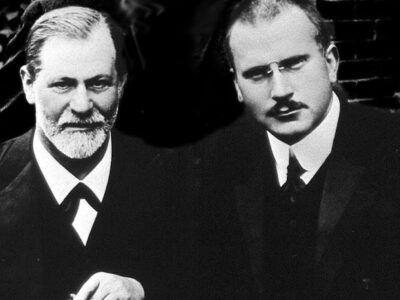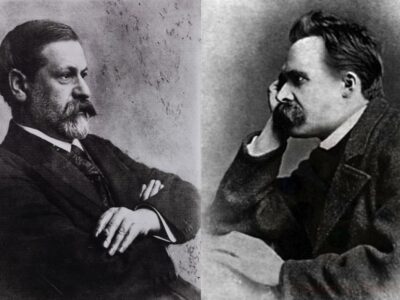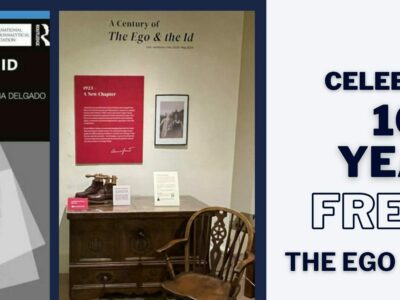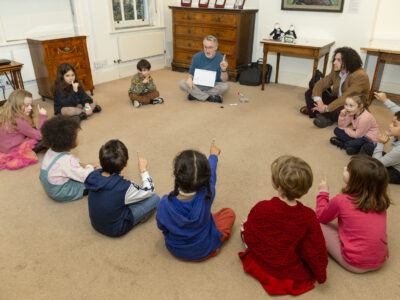
- This event has passed.

Online booking is now closed. Tickets can be bought at the door. The venue is The Music Lecture Theatre, UCS Senior School Frognal, Hampstead, London NW3 6XH, at the corner of Frognal and Arkwright Road.
Registration is from 9.00 – 9.30am on Saturday and 9.30 – 10am on Sunday.
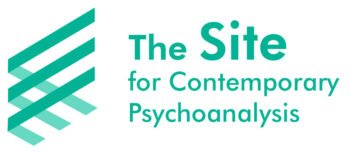
Organised by the SITE for Contemporary Psychoanalysis and the Freud Museum.
This two-day conference offers to explore the complex links between psychoanalysis and translation across history, culture, politics and psychoanalytic theory and practice. It brings together a prestigious panel of clinicians and theoreticians of psychoanalysis who will share their clinical and theoretical insights into these key questions. They will discuss how psychoanalysis and translation intersect, where they part and where they meet, and what they might ultimately have to uncover in each other – as well as in us all.
Download timetable
Conference Timetable
Abstracts
Biographies
Programme
Saturday
Rubén Gallo
Freud’s Spanish: Translinguistic Transexualism
Begum Maitra
Grasping at ‘difference’: Losing and finding culture in translation
Jonathan Sklar
Psychosomatics, Metaphor and Translation
All speakers
Morning plenary
Mark Solms
Has Freud been falsely scientised? Reflections from the editor of the new Standard Edition – pre-recorded paper
Laurence Kahn
How to Account for the Words of the Morning with the Words of the Night?
Dorothée Bonnigal-Katz
Thoughts on the day’s presentations
All speakers
Afternoon plenary
Sunday
Berjanet Jazani
The Art of Translation in Psychoanalysis: from Reciting a Myth to the Poetry of Knots
Robert Weiss
Making Strange: Beckett, Laplanche and Self-Translation
Barry Watt
The Capacity to Cleave Alone: Working therapeutically with the Homeless
All speakers
Morning plenary
Kristina Valendinova
Analysis and Self-Translation: The Question of the Mother Tongue
Anastasios Gaitanidis
Further Reflections on the Conference
All speakers
Final plenary and closing remarks
Farewell drink
Abstracts
Rubén Gallo
Freud’s Spanish: Translinguistic Transexualism
This talk will explore Sigmund Freud’s use of Spanish, a language he learned as a teenager in order to read Cervantes in the original. There has been much theoretical attention devoted to forgotten languages, but this case is different: Freud never forgot his Spanish, since he continued to read scientific literature in this language until the end of his life. But, astonishingly, Spanish was a language he used only with one person: Eduard Silberstein, his childhood friend. I will discuss the relationship between language and love, linguistics and sexuality.
Berjanet Jazani
The Art of Translation in Psychoanalysis: from Reciting a Myth to the Poetry of Knots
In light of the conference theme (Translation and Psychoanalysis), I will be exploring the concept of the Real Uncs in the context of “poetry.” I am intending to approach the question of translation in the clinic of the Subject who eventually moves from being a Subject of the Uncs to a Parlêtre.
Anastasios Gaitanidis
Further Reflections on the Conference
TBA
Laurence Kahn
How to Account for the Words of the Morning with the Words of the Night?
Was the mediation of a foreign language necessary to lift repression in the case of Anna O.? This paper explores the tension between “the failure of translation” as developed by Jean Laplanche and “this mysterious translation” described by Elias Canetti in The Tongue Set Free, a translation thanks to which, paradoxically, the memories of early childhood, preserved in all their freshness in his mind, were linked to words he did not know at the time. Must the alienness of the unconscious thing therefore be linked to the foreign in order to cross the border of consciousness? Asking the question in this way resonates with Antoine Berman’s dilemma: “How to account for the words of the morning with the words of the night?” According to him, the ethics of translation pertains to the introduction of “strangeness” as opposed to the aims of communication. But, between the attention given to the hidden resonances of Freud’s language, with its etymologies and its resurgences, and the risk of “explaining” his text, perhaps the translation choices are also “political” in the sense that they finally engage a destiny of analytic theory and practice that remains unsuspected at the time when translators translate. I will rely on specific examples to illustrate this problem.
Begum Maitra
Grasping at ‘difference’: Losing and finding culture in translation
All therapeutic exchange might be described as forms of translation, and ‘cultural difference’ could be said to exist in any encounter between two persons, whether by virtue of gender, age or class difference, or early experience of unimaginably different physical and socio-emotional settings. How far do these general truths assist the therapist in multicultural practice? The adult non-western client sufficiently integrated within western cultures may well seek therapy hoping, at least in part, to be translated in ways that ease the conflicts of bicultural lives. But how well are therapists prepared to explore the nature of these conflicts, and how much does it matter whether they translate accurately those desires, inevitably unconscious and inextricably linked with early experience, that lie outside the vocabularies and culturally western imaginations from within which psychotherapy arises. Using material from her practice in psychiatry and psychotherapy the speaker will explore some of the excitements and terrors of such explorations, translations and mis-translations across cultures.
Jonathan Sklar
Psychosomatics, Metaphor and Translation
In this paper contributing to the debate on translation and translatability in psychoanalysis I will be concentrating on ideas around the uses and functions of metaphor in language as a critical form that carries the weight of the unconscious that can transfer, as in transference, understanding and knowledge of that part of the mind.
Mark Solms
Has Freud been falsely scientised? Reflections from the editor of the new Standard Edition – pre-recorded paper
It is widely claimed that the authorised translation of Freud – the Standard Edition of his complete works – tendentiously distorted his writing to make it sound more scientific. For example, the ordinary German word for ‘I’ becomes ‘ego’ in the official translation, ‘occupation’ becomes ‘cathexis and ‘attachment’ becomes ‘anaclisis’. When the editor of the Revised Standard Edition – which appears this year – confronted this question, he was led to surprising conclusions, which he will report in this lecture.
Kristina Valendinova
Analysis and Self-Translation: The Question of the Mother Tongue
Contrary to the colloquial understanding of the mother tongue as a first language in which the union between words and things remains largely unperturbed, psychoanalysis helps us think differently about the contingencies and commitments of our immersion in the mother tongue, positing that any language that is to be inhabited must already be permeated with lack.
Barry Watt
The Capacity to Cleave Alone: Working therapeutically with the Homeless
This paper explores some key revisions in the fields of metapsychology and clinical technique, necessary to extend psychoanalytic psychotherapy to people experiencing extreme socio-economic deprivation and entrenched homelessness. In so doing, it identifies and critiques a parallel process, that is established when supposedly ‘compassionate’ policies towards homelessness, are translated into psychosocial clinical responses rooted in Attachment Theory. Arguing that, even as such translations aim to widen the social-inclusion of homeless people, they in fact exacerbate conditions of exclusion through identity-stigmatisation and accommodation-segregation. By reducing homeless people to victims of pathological environments, deprived of agency and the ability to make informed choices, increased social isolation, de-individualisation and despair result when the homeless are funnelled into paternalistic processes of corrective re-adaptation and normalisation.
Drawing on the political thought of Giorgio Agamben and Leonard Feldman, the psychoanalytic work of Winnicott, and the largely neglected work early Hungarian psychoanalyst Imre Hermann, a revised psychoanalytic anthropology is suggested, with the hope of making clinical work with homeless people more widely available, whilst simultaneously deepening understanding of the socio-political context in which homelessness occurs and is publicly addressed.
Robert Weiss
Making Strange: Beckett, Laplanche and Self-Translation
“Anger led me sometimes to slight excesses of language. I could not regret them. It seemed to me that all language was an excess of language. Naturally I confessed them. I was short of sins.”
(Molloy)
In this paper I intend, through examining some of the moments of self-translation undertaken by Samuel Beckett, to think about the ways new constructions/translations can be produced in the analytic space. I will focus on some of the ideas of Jean Laplanche—particularly those that engage with the failures of translation that are, after Freud, linked to primal repression—to argue that a process of making strange is needed in order to open up pathways to repressed material.
I intend to think on this in conjunction with Laplanche’s notion of the “hollow of the enigma,” a space where new constructions/translations can be approached in the dialogue between analyst and analysand. Laplanche is clear that this can be achieved via an engagement with a self-construction/translation that, like Beckett’s practice of writing in French and translating to English, is “a deconstruction of old constructions,” rather than a series of, more or less successful, acts of recall.
These moments of making strange could, of course, be read alongside Freud’s notion of the uncanny, where the intimate and strange collide to disturbing effect. My intention in this paper is to move away from this reading to focus instead on the use-value of making strange; of the possibilities that can be opened up if we take that which is already close, known, or recognised to us in our language and render it unheimlich. In a reading of Beckett’s texts, I want to argue that there is a further point after the uncanny move from the familiar to the unfamiliar, a move exemplified by Beckett’s French original text (self)-translated back to English, creating language that occupies the place of what I would like to call the unfamiliar familiar.
For Beckett it was his mother tongue that was excessively proximate, that had to be made strange in order to break down—and rebuild—meaning in language. Beckett spoke of wishing to escape from what he knew as familiar Anglo- Irish exuberances and automatisms and write in a language that could surprise and excite him. What changes in this process of detranslation? And in rendering the text back into English, this time stripped of the familiar cadences, what changes in the retranslation? I intend to examine the extraordinary trilogy of novels Beckett produced between 1955 and 1958, Molloy, Malone Dies and The Unnamable to think about these questions.
Speakers’ Biographies
Rubén Gallo is the Walter S. Carpenter Jr. Professor in Language, Literature and Civilization of Spain at Princeton University. He is the author, most recently, of Conversación en Princeton (2017), with Mario Vargas Llosa. Gallo’s other books include Proust’s Latin Americans(2014), an essay about Proust’s Latin American circle of friends in turn-of-the-last century Paris; Freud’s Mexico: Into the Wilds of Psychoanalysis (2010), a cultural history of psychoanalysis and its reception in Mexico; Mexican Modernity: the Avant-Garde and the Technological Revolution (2005), an essay about the Mexican avant-garde’s fascination with machines, and two books about Mexico City’s visual culture: New Tendencies in Mexican Art (2004) and The Mexico City Reader (2004). He is the recipient of the Gradiva award for the best book on a psychoanalytic theme and of the Modern Language Association’s Katherine Singer Kovacs Prize for the best book on a Latin American topic. He is a member of the board of the Sigmund Freud Museum in Vienna, where he also serves as research director. He is currently at work on “Cuba: A New Era,” a book about the changes in Cuban culture after the diplomatic thaw with the United States.
Berjanet Jazani is a medical doctor and a practising psychoanalyst in London. She is a trustee and an analyst member of the Centre for Freudian Analysis & Research, where she teaches and supervises clinicians and candidates. She is Honorary Secretary of the College of Psychoanalysts-UK. She has given lectures on Lacan in Birkbeck, Middlesex and Bristol universities and gives talks on Psychoanalysis in museums and clinical centres. She has contributed to CFAR Journal “Le Silence de la Mer(e)” JCFAR 2018/2019. Forthcoming publications include: Phoenix: Faces of Desire (Routledge, 2019), Lacan, Forbidden!in Persian (2019), “Smell,” a research project on the concept of Drive in psychoanalysis and olfaction and Never Explained, a collection of essays focusing on the concepts of the Unconscious, desire and jouissance (2020).
Anastasios Gaitanidis is a Senior Lecturer at the University of Roehampton and a member of the Site for Contemporary Psychoanalysis. He is also a Psychoanalytic Psychotherapist in private practice and a Writer. He has published several articles on psychoanalysis and psychotherapy in peer-reviewed journals and he is the Editor of two books: Narcissism – A Critical Reader (2007) and The Male in Analysis – Psychoanalytic and Cultural Perspectives (2011). He is in the process of editing his third book (No) Ordinary Encounters: Psychoanalytic and Aesthetic Perspectives on the Sublime in Everyday Life.
Laurence Kahn is a Training Analyst at the French Psychoanalytic Association (APF) in Paris and she was the President of the APF from 2008 to 2010. She was previously co-editor of the Nouvelle Revue de Psychanalyse and the editor in chief of L’Annuel de l’APF. She has written numerous articles and books, including Psychoanalysis, Apathy and the Postmodern Patient (Routledge, 2018). Her latest book, What Nazism did to Psychoanalysis is currently being translated into English.
Begum Maitra trained in India as a psychiatrist, and after two decades as a child and adolescent psychiatrist in London gave up this discipline altogether to practice exclusively as a psychotherapist. While she was trained as a Jungian Analyst (AJA) her practice includes the diversity of approaches that permeate the mental health field, drawing also on her long practice as an independent expert in family courts, and consultant in related areas. This means that her approach to psychotherapy includes, among other influences, a good measure of those from critical psychiatry, systemic family therapy, and social and cultural anthropology. She writes, supervises, and delivers lectures, workshops, and training when requested. She was co-author with Inga-Britt Krause in 2015 of Culture and Madness (Jessica Kingsley Pub) which includes a film How Culture Matters(Maitra and Livingstone, 2015), and has published numerous papers and chapters on working with culture.
Dr. Jonathan Sklar MBBS, FRCPsych is an Independent training and supervising psychoanalyst of the British Psychoanalytic Society. Originally trained in psychiatry at Friern and the Royal Free Hospitals, he later trained in adult psychotherapy at the Tavistock Clinic, London. For many years he was consultant psychotherapist and head of the psychotherapy department at Addenbrooke’s and Fulbourne hospitals in Cambridge. He now works in full-time analytic practice in London . As well as lecturing widely across the world, he has taught psychoanalysis annually in South Africa for over 10 years , termly in Chicago for ten years until 2018 as well as regularly across Eastern Europe. From 2007-2011, he was Vice President of the European Psychoanalytic Federation, with special responsibility for seminars for recently qualified analysts as well as new analytic groups in East Europe. He is presently a board member of the IPA. His books include Landscapes of the Dark – History, Trauma, Psychoanalysis (Karnac, 2011), Balint Matters – Psychosomatics and the Art of Assessment(Karnac, 2017) and Dark Times – Politics History and Mourning (Phoenix Press, 2018).
Mark Solms is Director of Neuropsychology at the University of Cape Town. He is a member of the British, American and South African Psychoanalytical Associations, and has won many awards, including the Sigourney Prize. He has published over 300 articles and six books. He is editor and translator of the forthcoming Revised Standard Edition of the Complete Psychological Works of Sigmund Freud (24 vols) and the Complete Neuroscientific Works of Sigmund Freud (4 vols). He has spoken at many Freud Museum conferences, including the Poetry Festival in 2016 (‘Word and Image’) and ‘The Unconscious Today’ (2015)
Kristina Valendinova is a psychoanalyst and translator based in London. She is a member of the Cercle Freudien in Paris and a trainee at CFAR.
Barry Watt is a member of The Site for Contemporary Psychoanalysis. He is a Senior Psychotherapist at the Psychosis Therapy Project and a Senior Psychotherapist at St. Mungo’s Community Housing Association in Waltham Forest.
Robert Weiss is a psychoanalyst, supervisor and teacher and a member of the Site for Contemporary Psychoanalysis.
